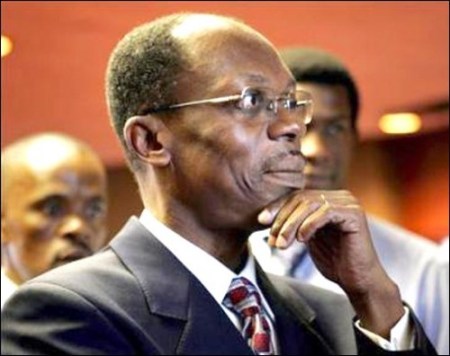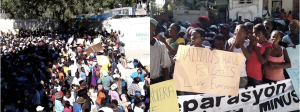“Self-Appointed Saviors”
The world has imposed solution after solution on Haiti.
Woodrow Wilson sent the US Marines to occupy Haiti from 1915-1934, allegedly to “reintroduce stability.” But when they finally relinquished control of Haiti’s finances in the 1950s, Haiti had accumulated tens of millions in international debt.
In the 1980s, international agencies informed Haitian farmers that they would replace their native Creole pigs, because the local breed was sick. Unfortunately, the new pigs, fresh off the farms of Iowa, were unaccustomed to conditions in Haiti and died off – thereby eliminating the “primary savings account” for many farmers.
In the meantime, corporations and western governments pressured Haiti to abandon agriculture in favor of textile-led growth. Clinton later apologized, calling these policies a “devil’s bargain” that sold out Haiti’s farmers over false promises of growth through textile manufacturing. But no one has claimed responsibility for the most damaging consequence: the demise of the farming sparked a mass migration to the Port-au-Prince, where hastily constructed slums afforded no protection against the earthquake that claimed ~300,000 lives.
Doomed to repeat the past?
Since the earthquake, the international community has doubled down on its failed model of imposing solutions from without.
In the year after the earthquake, less than 1% of relief and recovery funds went to the Haitian government, Haitian companies, or Haitian NGOs. Instead, the world chose to fund a consortium of contractors who make a living off disasters. If there were any questions about the (in)effectiveness of this approach, they were answered when one high-profile project triggered protests and threats that farmers would burn the “aid” they received.
An Alternative: Beverly Bell and Grassroots Advocacy
This background explains why we’re so excited to host Beverly Bell in Minnesota April 21-23. Beverly Bell sees hope for Haiti’s future in the efforts of Haitian grassroots organizers and social movements. She has 3 decades of experience working with these types of organizations in pursuit of just economies; democratic participation; and rights for women other marginalized peoples.

Beverly Bell and her new book, Fault Lines.
If history is any indication, then she has the right formula. All the major milestones in Haitian history – from the successful slave revolt that made it the first free republic in 1804 to the democratic groundswell that toppled a dictator and ushered Haiti’s first democratic leader into power – have been achieved through the struggle of the Haitian citizenry. At best, the international community has stood in the way. At worst – and much more often – it has actively undermined Haiti’s progress.
Fault Lines: An Important Post-Quake Account
Beverly Bell will speak about her recent book, Fault Lines: Views Across Haiti’s Divide. The book illustrates how the earthquake compounded pre-existing socio-economic injustices in Haiti. It sheds light on how the exploitative doctrine of “disaster capitalism” has driven the international response to the quake. And perhaps most importantly, it highlights the work grassroots actors are undertaking to resist this influence and define a future based on domestic priorities, rather than imported (and imposed) ones.
As the coordinator of Other Worlds Are Possible, Beverly Bell works not just to educate, but also to generate support for alternative movements and models of engagement.
Schedule
Beverly Bell will be appearing at St. Olaf, Carleton, University of Minnesota, and Macalester. Her public speaking schedule is as follows:
Northfield – Monday, April 21
St. Olaf:
“Other Worlds Are Possible”
4:00 PM, BC143 (2nd floor of Buntrock)
Carleton:
“Charity vs. Justice: Challenging the Global Engagement Model”
7:00 PM, Athenaeum (Carleton Library)
Minneapolis – Tuesday, April 22
Common Roots:
“Food Justice in Haiti: Monsanto, USAID, and Alternative Agriculture Models“
12:00 PM, Meeting Room
University of Minnesota:
“Disaster Capitalism: Lessons from Haiti”
4:30 PM, Blegen 155
Macalester:
“Disaster Capitalism: Lessons from Haiti”
7:30 PM, Neill Hall 401
For more information about Northfield events, contact Paul Miller (thehaitiman@msn.com)
For more information about the U of M event, contact Natalie Miller (mill5118@umn.edu)
For more information about Minneapolis events or other opportunities to connect with Beverly Bell, contact Nathan Yaffe (nathan.yaffe@gmail.com)



 Posted by Nathan Yaffe
Posted by Nathan Yaffe 


